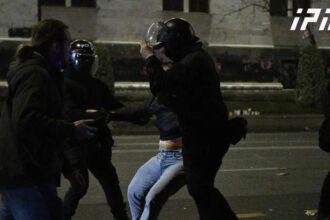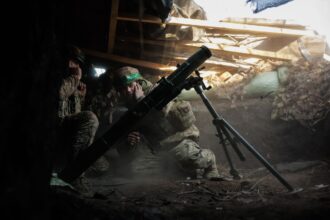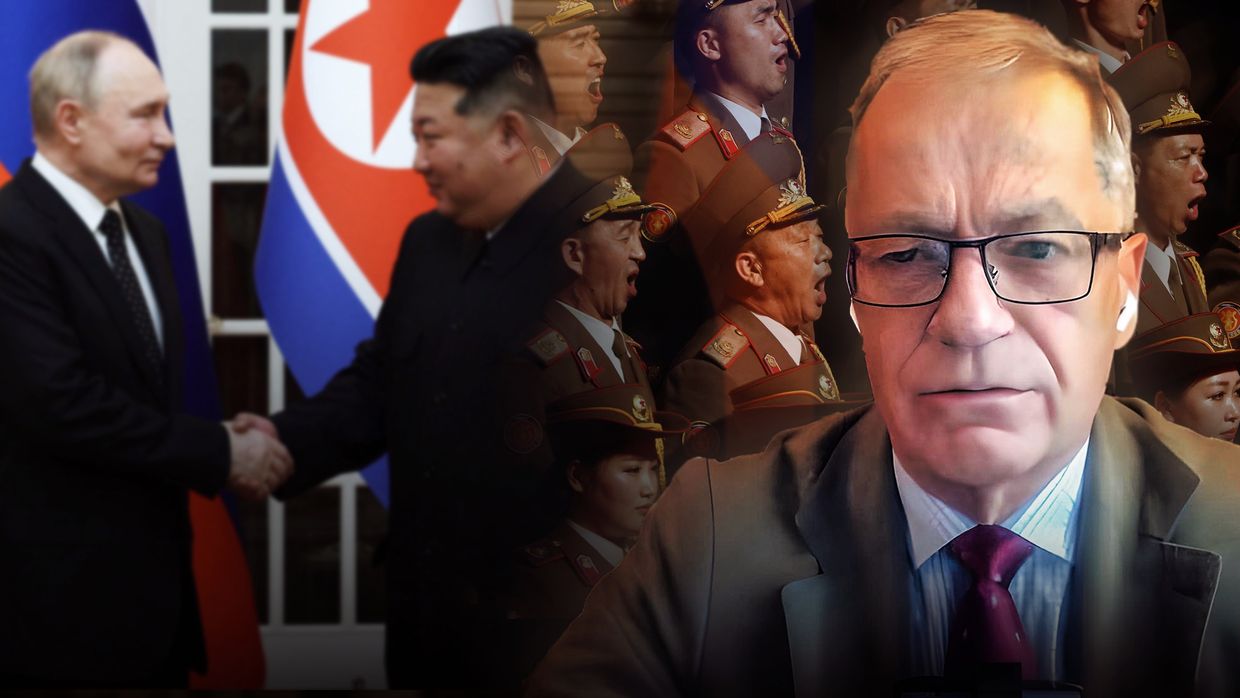Russian President Vladimir Putin and Chinese President Xi Jinping shake hands during a bi-lateral meeting in Beijing, China, on May 16, 2024. (Contributor/Getty Images)
Beijing quickly claimed that it was unaware of Russia’s growing partnership with North Korea.
The U.S. seized the opportunity to put pressure on China to prevent North Korea from actively participating in Russia’s war with Ukraine.
Observers are skeptical of China’s signals. They believe that the deal involving the deployment of North Korean troops to Ukrainian battlefields could not have been made without Beijing’s knowledge.
China, North Korea’s main ally, keeps the totalitarian Kim Jong Un regime afloat. Beijing also provides Russia with dual-use products worth billions of dollars, playing an increasingly important part in Moscow’s ability wage war against Ukraine.
Mathieu B. Boulegue, senior fellow at CEPA, told Kyiv Independent that, contrary to what China claims, Pyongyang wouldn’t have surprised China with a surprise troop deployment without having discussed it beforehand. The expert dismissed Beijing’s diplomatic messaging as “a big masquerade.”
China and North Korea are as close as “lips and teeth”
Mao Zedong, the Chinese dictator, once said that North Korea and his homeland are as close as “lips & teeth.”
North Korea is a useful buffer between China and U.S. allies in East Asia. The collapse of Kim Jong Un’s regime would also force millions of refugees to cross the Chinese border. This would create a major socioeconomic headache for Beijing.
Boulegue told the Kyiv Independent that “without China’s consent there would not be a North Korean government.” Beijing is Pyongyang’s only lifeline, more than half a century since Mao’s remarks.
China accounts for more than 90% of North Korea’s total trade turnover. North Korea’s economy fell by 4.5% when the two countries closed their borders in 2020 because of the Covid-19 pandemic.
The relationship hasn’t been easy.
China has been fostering economic ties with South Korea. It is now Beijing’s third largest trade partner.
Beijing has also expressed displeasure at the North Korean nuclear programme. China has reportedly shown restraint with its nuclear rhetoric, and discouraged Moscow from using nukes.
Bypassing Beijing
North Korea demonstrated its nuclear capabilities with an intercontinental rocket test on Oct. 31. Pyongyang declared South Korea as a “hostile country”, abandoning the previous official policy on “peaceful unification.”
Pyongyang is increasingly relying upon Moscow for support.
Ukraine and the U.S. think that North Korea received financial support to help its impoverished economy and technology for its nuclear program in exchange for arms and soldiers. Kim could also be excited to test his fighters in a modern battlefield.
According to Ukraine, North Korea sent 12,000 troops to Russia. The first soldiers are expected to join in November.
Lin Jian, spokesperson for the Chinese Foreign Ministry, said that “the Chinese side is unaware of the situation”.
The Chinese leadership is not happy that Moscow and Pyongyang kept Beijing out of loop.
Jan Svec is a China researcher with the Institute of International Affairs in Prague. He says that Beijing could be concerned by a “closer cooperation of South Korea, Japan, and the U.S.A. and NATO”.
“At the time, North Korea could become more dependent on Russia and less dependent on China. This would leave China with less leverage,” the expert told The Kyiv Independent.
Edward Howell, an expert on North Korea at Oxford University told the Kyiv Independent that the North Korean government wants advanced military and rocket technology. But the goal of signaling a persistent anti-Western alliance is also important.
“Russia has given North Korea unwavering support in the U.N. Security Council during the past year. This is a move that serves both Russian and North Korean interest.”
Howell says that “China won’t be happy with North Korea’s claims that Russia is its ‘number-one friend’.”
Boulegue, a specialist in Russian-Chinese relations, believes that it is unlikely that Pyongyang or Moscow would take such escalating steps without Beijing’s tacit consent.
“They (China), probably got something from Russia as a trade-off,” said the expert. “Another thing to ask is what did they receive in return?”
Boulegue emphasizes that, despite its diplomatic posture, China has indirectly supported Russia’s aggression towards Ukraine for years.
China, while not openly providing Russia with weapons, is a key player in Moscow’s war. It provides dual-use products that keep the Russian arm industry running, and help it to withstand Western sanctions.
Boulegue argues that from Beijing’s point of view, a “proxy” war in Ukraine creates “a cheap and efficient splinter” that “keeps us (the West), busy” while keeping their hands clean.
“North Korea is definitely a part of this indirect strategy.”
Beijing sticks with its allies
Proponents of the notion that China is unhappy with North Korea cite Beijing’s economic interest in Europe and its desire for regional stability.
China is not afraid to confront the U.S. especially when it comes Taiwan. China, while enjoying profitable trade with the EU and trying to undermine their bond, generally avoids antagonizing them.
The West has already branded China as the cause of Russia’s war and highlighted the Chinese role at the recent NATO summit. The U.S., EU and other countries have also imposed sanctions on Chinese companies.
China does not seem to be concerned.
Svec is of the opinion that “I don’t believe that this (the transfer) is such an important step that will lead to a significant change in China’s attitude towards North Korea or Russia.”
It is unlikely that the U.S. will have any more success in its request to China than it has had during the past two-and-a half years of war.
Boulegue claims that the West has no leverage to exert pressure on North Korea via China.
The expert also argues that poorly trained and equiped North Korean troops will not be able to “change the strategic game” on the battlefield. He expects Moscow will keep them mostly in supporting roles to avoid heavy losses on their behalf.
He concludes that putting North Korean troops in “human wave” assaults that Russian troops face every day “will not look good for the relationship (Russia has) with China and North Korea.”
Martin Fornusek works as a news editor for the Kyiv Independent. He was a news editor at Newsmatics, and a contributor to Euromaidan Press. He also volunteered as an editor and a translator at the Czech version of Ukrainer. Martin studied at Masaryk University, Brno in Czechia. He holds a bachelor’s and master’s degrees in security studies, history, and conflict and democracy studies.
Read More @ kyivindependent.com




